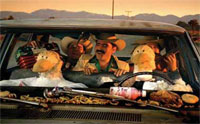



Profile of California's Major Producer
Bob Wangerien, senior vice-president of marketing at Foster Farms, is interviewed about his company's business philosophy and strategy in Cobb's Business Focus. magazine.Foster Farms has remained a family-owned and operated business since its founding by Max and Verda Foster in 1939. The company’s principles are based on its family focus, including a devotion to high quality products and maintaining consumer trust.

Consumers have come to trust Foster Farms to provide them with high quality products that meet their desires for fresh, healthy, delicious meal choices. By staying close to our customers and consumers, the company has successfully grown and today sales are in excess of $1.7 billion.
To meet the market demands, Foster Farms buys breeders from Cobb and processes between 5.5-6.0 million birds a week. The company has four chicken processing plants - two in Fresno, one each in Livingston, in Kelso (Washington State) - along with two turkey plants covering primary and further processing operations. Foster Farms is a regional company with distribution primarily in the west coast including all states west of Colorado plus Alaska and Hawaii.
Foster Farms, even with its growth, maintains the values of a small, family-owned business. Our employees are highly trained and many have been with the company for decades. Being family-owned allows us to have a long-term perspective and to focus our investments in areas that align with our customers' and consumers' future needs.
 |
Providing the best service levels to our customers is extremely important to us. We are dedicated to being a consistent, dependable supplier, and a good business partner. Food safety is critical to maintaining our customers and consumers trust.
We maintain stringent biosecurity measures at all times to ensure the quality and safety of our product, and our practices meet - and at times, exceed - industry and government standards. We are good corporate citizens and intend to continue to follow in this direction.
Fresh and natural is a very important focus for the company. Foster Farms specializes in producing high quality fresh chicken products that are all natural with no preservatives or sodium-based additives. Our fresh chicken and turkey products are always natural, which goes hand-in-hand with what consumers expect when they are buying fresh poultry.
Based on consumer research, we believe natural will become even more important for consumers. Because we believe so strongly in this, we do not sell enhanced chicken in the important fresh category of our business. We align our business around our core brand equity of fresh and natural.
The company has joined other industry members in supporting the Truthful Labeling Coalition, a grassroots organization dedicated to encouraging the USDA to adhere to labeling policies that disallow unclear or confusing product claims on packages of fresh poultry relative to the term 'natural'.
To meet consumers’ desires for truly healthy products, we take on product reformulation as an internal initiative forging ahead with the introduction of whole grain batter, reduced fat and salt in our corndog product, which now meets all the requirements sought by schools for healthy eating. Foster Farms is also one of the largest organic suppliers offering a line of fresh chicken and turkey products under the brand name, Coastal Range Organics, in this rapidly growing category.
Foster Farms is the number one brand of chicken in the west of the US. Maintaining and strengthening our number one branded position is critical to our long-term success. Our company has been recognized both in and outside the industry as leaders of brand development.

In 1993, we launched the 'Foster Imposter' television advertising campaign developed by the San Francisco-based advertising agency Goodby, Silverstein and Partners. In this campaign, two out-of-state junk-food-eating chicken, have been trying to masquerade as fresh Foster Farms chickens. In doing so, they spread the word about what it takes to be a Foster Farms fresh chicken - always natural, always fresh, locally grown chicken with no added sodium, preservatives, hormones or steroids.
Since they were first 'hatched', the Foster Imposter commercials have gained a loyal following. The Foster Imposters have appeared in more than 30 different commercials since 1993, including several in Spanish and have been viewed by millions of consumers in the western states.
Our consistent support of the Foster Farms brand with effective advertising has proven successful. Market research shows a top-of-mind brand awareness of over 75 per cent (unaided question) and total brand awareness in excess of 95 per cent (aided question). Over 50 per cent of respondents consistently rate Foster Farms fresh chicken as being 'natural' at a level of 9 on a 10-point scale.

This investment and long-term commitment to the company’s brand and the image it conveys provides consumers with a reason to believe that Foster Farms is their best choice for fresh and natural chicken, and customers with a reason to continue to support and merchandise our line of Foster Farms branded products.
Additionally, over a decade ago, Foster Farms made a commitment to improve and support ‘category management’ with our retail customers.


Historically, the random weight fresh meat category lacked the necessary data to provide adequate category information and analysis. We partnered with a company and invested in the tools necessary to acquire this data. We are now able to provide our customers’ analyses that can help them optimize their buying and therefore their returns. This helps us differentiate ourselves from others and helps the sales of both branded and third-party products.
Does California have some unique differences which set suppliers apart from the rest of the US?California has some differences with the rest of the US, particularly in the area of government regulations relative to the environment. Consumers in the western states historically have been more concerned and active with regard to environmental sustainability and 'green' choices. While this movement has recently expanded across the US, regulatory requirements have been much more stringent in California for several years. Because of this, and the increased cost associated with meeting the stricter regulations, our company operates at a disadvantage to the rest of the ‘non-California’ industry.”
The area also supports a more diverse population. Income levels are higher than in other states, allowing consumers to be more selective in their final product selection. The West also represents a higher portion of immigrants than the nation, bringing unique culture and food preferences more clearly into view in California. This translates into different consumer demand patterns than the US generally. For instance, dark meat consumption is higher and more readily sold through regular retail. Whole bird sales are also a more significant part of retail here than other regions.
As a family-owned company, we have a long term view and will continue to stay closely involved with our customers and consumers.We are committed to further developing the chicken category in our market, and to ensure that chicken continues to grow as a percentage of the total protein consumed in our region.











